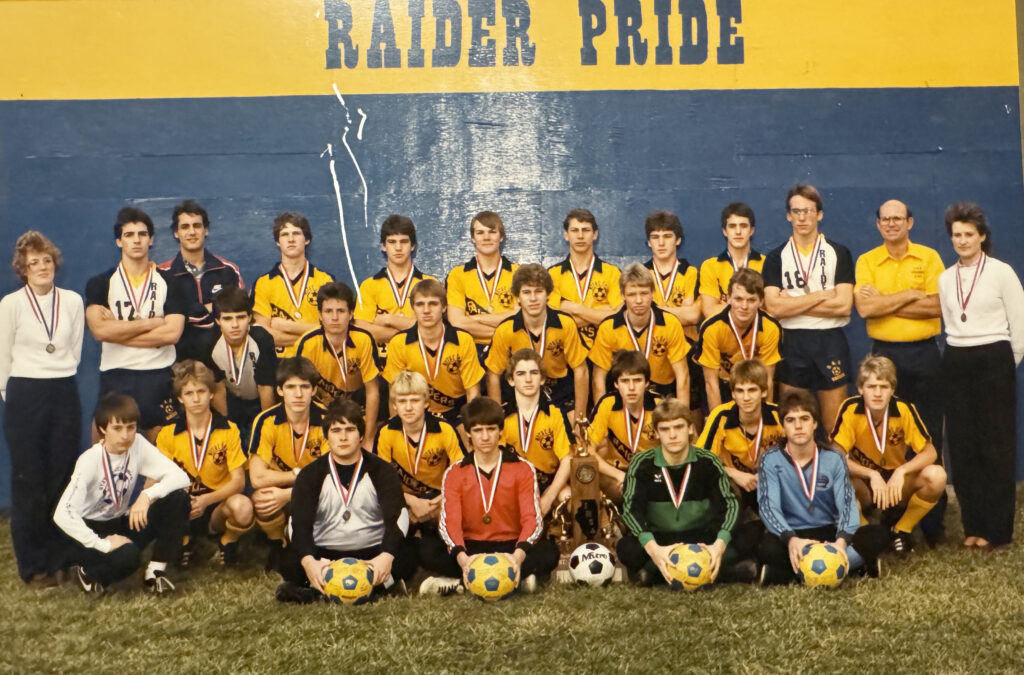Crim: QND’s 1984 state runner-up boys soccer team responsible for raising bar on expectations

QUINCY — The longest boys soccer game in Illinois High School Association history was played 40 years ago.
Performing on the biggest stage on Nov. 3, 1984 — the state championship game at St. Charles High School — Quincy Notre Dame and Palatine Fremd battled through 80 minutes of regulation and another 40 exhausting minutes over eight overtimes before the Vikings prevailed in the scoreless duel on penalty kicks.
It was a disappointing finish for the third-ranked Raiders, who were making their third appearance in the one-class state tournament in four years. They had rallied in the final seven minutes to upend undefeated and top-ranked Hinsdale South in the quarterfinals and dominated sixth-ranked St. Charles in the semifinals.
QND appeared to be on the cusp of writing a storybook ending to a storybook season. But it was forced to play the championship game without leading scorer Mark Thomas (26 goals), who suffered a concussion hours earlier in the waning minutes against St. Charles with a substitute waiting at midfield to replace him.
That proved to be the difference.
“Fremd was the weakest (of the final four teams) in the tournament,” said Jeff Tweedell, the Raiders’ senior goalkeeper. “They were good, but we would have won by four goals if Thomas would have played. They weren’t going to score on us. We just didn’t have that guy up front to score.”
“It was a gut punch, for sure,” said Kevin Koetters, a junior forward who scored 16 goals that season. “Mark was good for a goal or two per game. Not only was he dangerous, but teams keying on him opened it up for other guys.”
“I remember watching that game from the sideline in street clothes thinking, ‘Boy, if I was playing … ’ ” said Thomas, a junior forward who already had registered three goals in the two previous tournament games. “Things happen. What can you do?”
The legacy of that team is more than just the title game loss or the length of that contest, however.
The Raiders went 20-4-2, winning 12 of 13 games before the Fremd encounter. They outscored their opponents 83-24 and beat perennial powerhouse Granite City, then owner of seven of its 10 state championships, for the first time during the regular season.
They had three classic battles with crosstown rival Quincy High School — tying the first and winning the second, both going overtime, and outlasting the Blue Devils in the regional finale 1-0 thanks to a Chris Bichsel goal with 2:44 remaining.
They became the first Quincy team to reach the final four. All 11 starters went on to play in college, several at the NCAA Division I level, and three — Thomas, Koetters and John Prow — eventually played professionally.
“We kept pushing and pushing and broke the seal,” said Greg Reis, a two-time All-American sweeper.
It was a confident, close-knit group. Many had learned the game from legendary Quincy University coach Jack Mackenzie in the Quinsippi Soccer League. Players regularly gathered at coach Al Knepler’s house to watch “Monday Night Football” over pizza and caramel corn made by Thomas’ mother, Dee.
“I think that was the best team to ever come out of Quincy,” said Tweedell, now a partner with Winters Insurance Group. “We got along so well. There was no animosity, no jealousy. Everybody knew their role and Thomas and Koetters always kept us loose. We were one big family.”
Those on the outside may not have predicted such success.
QND returned only three starters from the 1983 team that lost in the state quarterfinals — Thomas and seniors Bichsel and Reis.
Tweedell had appeared sparingly during his varsity career. Two other seniors, fullback Bernie Vahlkamp and midfielder Pat Klingele, were stepping into full-time roles. Six sophomores would be asked to make significant contributions.
“Greg Reis was the captain, the kind of leader who kept everybody together,” said Knepler, who coached QND for 10 seasons. “The key was the juniors and seniors didn’t treat the sophomores like sophomores. We put the best players on the field, and everybody went out there and had fun.”
Rebuilding was a word bandied about during the preseason, although the players didn’t buy it.
“I don’t think if you had asked any of us that we thought we were underdogs,” Reis said. “Our class was really strong and the class underneath us was really good. We had a great group of guys who had a tremendous amount of fight and desire. We were all very competitive and hated losing.”
“To be frank, we had a lot of players on the bench (in 1983) who could have played,” said Tweedell, who became the first QND keeper to be named all-state. “Knepler played the seniors. If we had subbed, we would not have missed anything. We just had to wait our chance.”
The Raiders took a 5-0-1 record into their annual Chicago trip in mid-September, where they lost to St. Charles (2-0) and tied Evanston (1-1).
After a 2-1 road win against Collinsville, another Metro East power, they lost 2-1 to St. Louis University High. A week later they beat Granite City 2-1 at Flinn Stadium, a watershed moment.
That stretch gave the team an indication it could compete with the best.
“Knep was a genius with our schedule,” said Reis, who has since guided QND to three state titles in 28 seasons as coach. “He would always say 25 percent of your games you should never win, 25 percent you should win and the rest were straight up. We didn’t realize it at the time, but it gave us a place to gauge ourselves.”
After beating QHS in the regional, the Raiders posted shutout victories over Peoria Bergan and Springfield in the sectional to earn a quarterfinal berth against Hinsdale South (23-0), which had beaten defending champion and second-ranked Glenbrook North in the sectional finals.
“We never had an easy draw in the quarters,” said Thomas, noting QND had lost in that round to eventual champion Glenbrook North 2-0 in 1981 and to third-place finisher Evanston 1-0 in 1983. “But there shouldn’t be when you get to state.”
“It was the third time in four years we had been there,” Reis said. “We had played a tough schedule. We believed anything was possible.”
Hinsdale South dominated the statistics, outshooting QND 11-1 in the first half and 19-7 overall.
Yet, the game was scoreless until six minutes had elapsed in the third quarter when a throw-in eluded the Raiders’ fullback line and Koetters’ attempt to clear it from the goal mouth went off the foot of the Hornets’ Kenny Smith and past Tweedell for a 1-0 lead.
That’s how it stood when QND was awarded a free kick after Koetters was dragged down near the touch line with a little more than seven minutes remaining. Koetters hit a floater that Thomas headed in to tie it.
Three minutes later, Thomas dribbled into the box and drilled a rocket that kept rising and caromed off the underside of the crossbar. Koetters, racing in from the right wing, headed the loose ball over the head of keeper Steve Grist for what proved to be the game winner.
“I was thinking, ‘Is this going to be another year where we don’t score (at state)?’ ” Knepler said. “And then that sequence happens when we went bang, bang.
“I remember it like it was yesterday. Tweedell ran up to me afterward and gave me a big hug and said, ‘Coach, we won this for you.’ I was in tears, to be honest. That’s the kind of players we had at QND.”
The rematch against St. Charles in the semifinals was nothing like the regular-season contest. Thomas scored two goals in a four-minute span in the first quarter against shellshocked keeper John Punis, who was riding a nine-game shutout streak, and Reis and Koetters tacked on goals in the third period en route to a 4-2 victory.
However, the celebration was muted after seeing Thomas, who also had suffered a concussion against Granite City, go down.
“The game was in hand,” Thomas said. “We had a goal kick, and I remember the ball bouncing and I went up to flick it on and a kid hit me from behind with an elbow and clocked me right behind the ear. I was out before I hit the ground.”
A doctor advised against playing that night and Thomas’ parents agreed.
“Thomas tried to talk his parents into letting him play,” Tweedell said. “He told them he would just go in for five minutes, score and come right back out. And he probably would have.”
Both teams recorded 28 shots in the championship game, but only six combined necessitated saves as the defenses dug in. One of QND’s best chances came in the fourth sudden-death overtime when Chris Mackenzie’s shot from the left corner of the penalty box hit the crossbar.
“By the end of regulation and through the overtimes, both teams were gassed,” Knepler admitted.
“It was a war of attrition,” Koetters said.
“Somebody had to lose, and we drew that straw that night,” said Thomas, now a talent acquisition specialist for Blessing Hospital and head coach of the QND girls soccer program.
Fremd made all five penalty kicks while QND missed the second of its four tries, and just like that it was over.
“Penalty kicks is a great way to finish a game if you win and a terrible way to finish if you lose,” said Koetters, who works in sales in the Kansas City area. “In the moment it was crushing. Then we get back to Quincy and realize we had a pretty good run.”
That run would continue for two more seasons.
With Thomas, Koetters and a bevy of seasoned underclassmen returning, the Raiders won their first title the following year with a late goal by Prow in the rain and mud against Collinsville.
“We’re not talking three classes; we’re talking true state champion. Not going to happen anymore,” said Thomas, who scored four of QND’s six goals in the state finals to earn all-state honors for a second straight year. “It was pretty cool to play the big boys and slay the dragon.”
Then, with the 1984 sophomores now seniors, they finished third in 1986 to cap a stretch of five state tournament appearances and three trophies in six seasons.
What’s most impressive is that QND was always the smallest school in the tournament field. And it was the 1984 team that raised the bar.
“We’re a small downstate school hanging with large, powerful Chicago suburban schools,” Koetters said of the final weekend. “During the moment we weren’t thinking about any of that. We were just playing.”
Miss Clipping Out Stories to Save for Later?
Click the Purchase Story button below to order a print of this story. We will print it for you on matte photo paper to keep forever.

